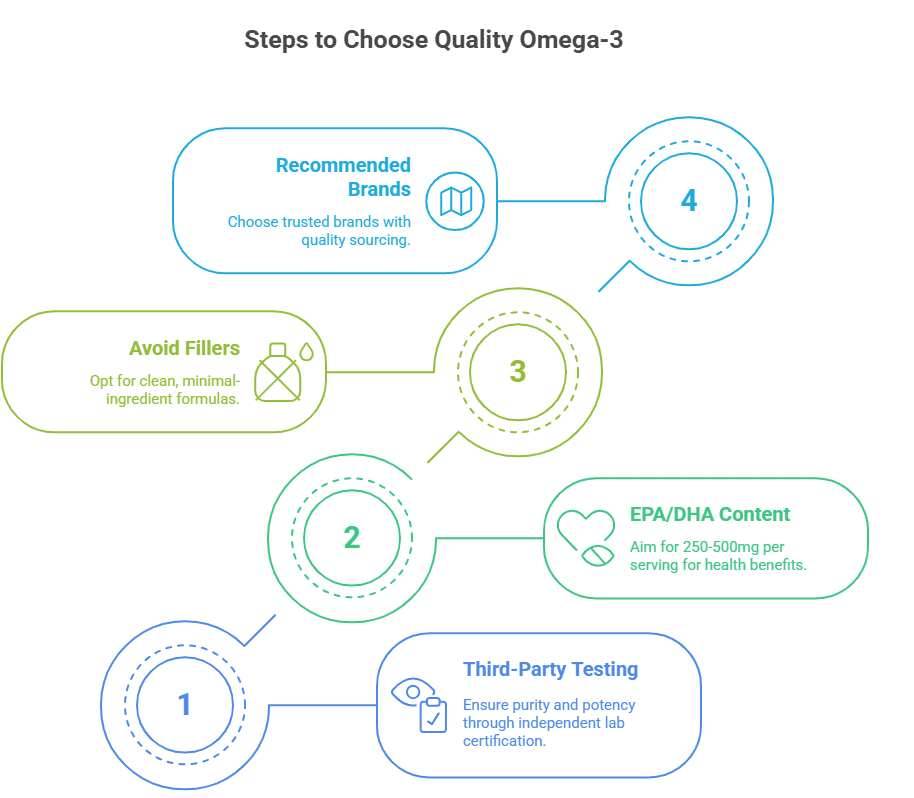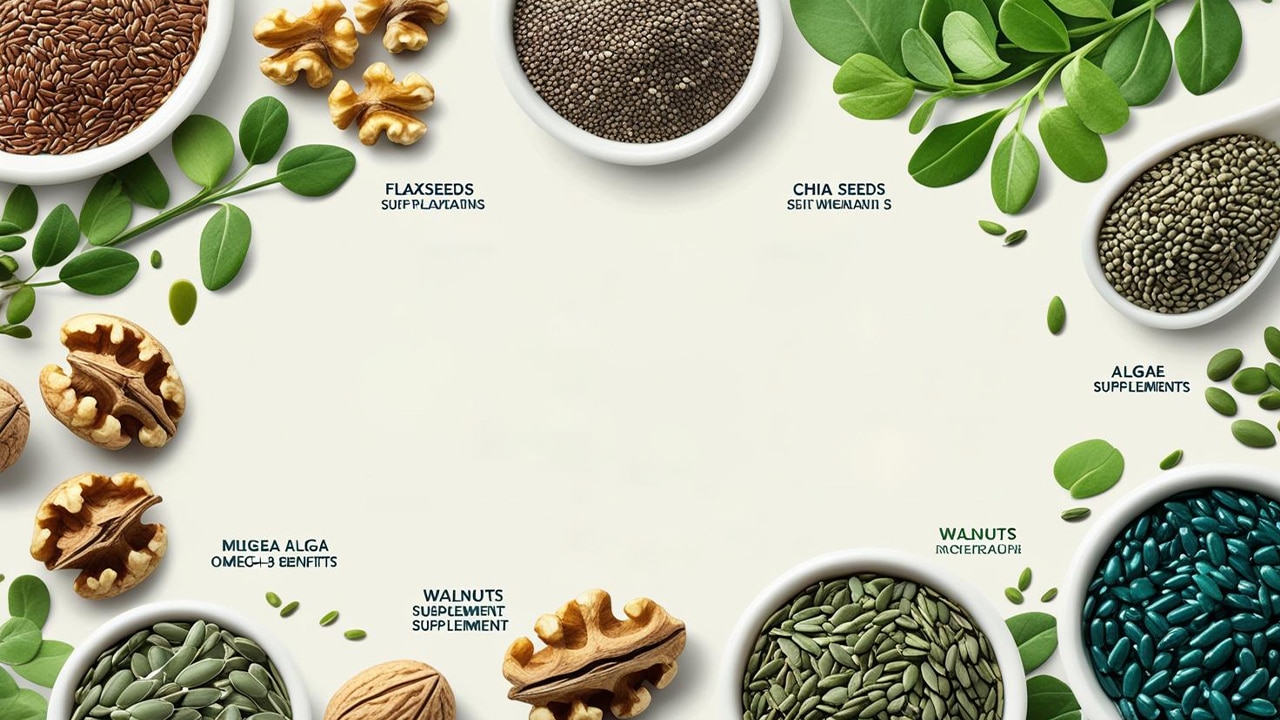Think about the ocean and all the tiny plants and creatures living in it. These little algae are the original source of the healthy Omega-3 fats many of us get from fish. Fish oil has been the popular choice for boosting Omega-3s for years, but what if you don’t eat fish or any animal products and are searching for vegetarian Omega-3 Alternatives?
If you’re a vegetarian, this can be a real problem because your body still needs those essential fats to stay healthy.
The good news? There are plenty of fish oil alternatives made just for vegetarians. In this article, we’ll break down the best plant-based sources of Omega-3s, explain why they matter, and help you find the right options to keep your body strong and balanced, without eating fish.
Understanding the Need: A Fish-Free Solution
Fish oil is a primary source of Omega-3 fatty acids, particularly EPA and DHA, which are vital for heart, brain, and eye health. However, since fish oil is derived from fish, it is unsuitable for vegetarians and vegans who avoid all animal products. This creates a nutritional gap because the body cannot efficiently produce EPA and DHA on its own.
Vegetarians mainly get Omega-3s from flaxseeds, chia seeds, and walnuts, which contain ALA (alpha-linolenic acid), a precursor to EPA and DHA. Unfortunately, the conversion of ALA into EPA and DHA in the human body is very limited, often less than 10%. As a result, vegetarians may not get enough of these essential Omega-3 fats to support optimal health.
Best Vegetarian Omega-3 Sources
Finding reliable plant-based sources of Omega-3s can feel like a puzzle, especially when you’re aiming to match the benefits of fish oil without compromising your vegetarian lifestyle. Fortunately, nature provides several powerful options that are not only effective but also easy to include in your everyday meals. Here’s a closer look at the top vegetarian Omega-3 sources and how they can support your health:
Algal Oil: The Superior Fish Oil Alternativefish oil and digestion

- Why It’s the Best – Direct source of EPA/DHA (no conversion needed)
Algal oil provides EPA and DHA directly the key Omega-3s your body needs without relying on conversion from ALA like many plant sources. This means your body can use these essential fats immediately for better health benefits. - Absorption & Effectiveness – Just as bioavailable as fish oil
Research shows that Omega-3s from algal oil are absorbed just as well as those from fish oil, offering similar support for heart, brain, and joint health. - No Fishy Aftertaste or Burps – A major perk for sensitive users
Unlike fish oil, algal oil doesn’t cause fishy burps or aftertaste, making it easier and more pleasant to take daily. - Sustainability Benefits – No overfishing or ocean ecosystem harm
Algal oil is sustainably produced by farming microalgae, reducing pressure on wild fish populations and protecting ocean ecosystems. It’s an eco-friendly alternative that supports both your health and the planet.
Flaxseed Oil: A Plant-Based ALA Powerhouse
Flaxseed oil is one of the richest sources of ALA (alpha-linolenic acid), a plant-based Omega-3. While ALA must be converted into EPA and DHA in the body and the process isn’t very efficient flaxseed oil still plays a valuable role in a vegetarian diet.
It’s best used in cold dishes like salad dressings or added to smoothies since heating can damage its delicate fats. Just a spoonful a day can give your Omega-3 intake a solid boost.
Chia Seeds & Hemp Seeds: Tiny Seeds, Big Benefits
Chia and hemp seeds may be small, but they pack a nutritional punch. Both are rich in ALA and also provide fiber, protein, and essential minerals. Chia seeds absorb liquid and form a gel-like texture, making them perfect for puddings or overnight oats.
Hemp seeds have a mild, nutty flavor and can be sprinkled on salads, blended into smoothies, or baked into snacks. These seeds are versatile, tasty, and easy to work into almost any meal.
Walnuts & Walnut Oil: Crunchy and Omega-Rich
Walnuts are another excellent vegetarian source of ALA. Just a handful a day can support heart health and provide a satisfying, nutrient-dense snack. Walnut oil, like flaxseed oil, is best used in cold dishes to preserve its Omega-3 content.
Its rich, nutty flavor adds depth to salad dressings, drizzles for cooked veggies, or even a finishing touch for grain bowls.
Seaweed & Spirulina: A Marine Plant Bonus
While not as concentrated as algal oil, certain types of seaweed and spirulina contain some levels of EPA and DHA. These marine plants also offer a range of additional nutrients, like iodine, iron, and antioxidants, that support thyroid function and immune health.
Because Omega-3 content can vary by species, seaweed is best used as a supplemental rather than a primary source. Add dried seaweed to soups or salads, and mix spirulina into smoothies for an extra nutrient hit.
Benefits of These Vegetarian Omega-3 Alternatives
Plant-based Omega-3 sources offer a powerful way to support your health while honoring a vegetarian or vegan lifestyle. These alternatives provide essential fatty acids that are key for heart, brain, and eye health. Choosing the right sources ensures you get all the benefits without compromising your dietary values.
Heart Health Support
Plant-based Omega-3 sources like algal oil, flaxseed, chia seeds, walnuts, and hemp seeds help maintain healthy cholesterol levels and support overall cardiovascular function. Regular intake may reduce the risk of heart disease by lowering blood pressure, improving artery flexibility, and reducing harmful triglycerides.
Anti-Inflammatory Properties
Omega-3 fatty acids are known for reducing inflammation in the body. These plant-based options provide ALA, EPA, and DHA, which help calm chronic inflammation a factor linked to many conditions like arthritis, autoimmune diseases, and metabolic disorders.
Brain and Eye Health Benefits
EPA and DHA are crucial for brain development and cognitive function, as well as maintaining healthy vision. Vegetarian sources like algae oil offer these essential fats directly, supporting memory, focus, mood, and eye health throughout life.
Suitable for Vegetarians and Vegans
All these alternatives are plant-based or sustainably sourced from microalgae, making them perfect for vegetarians and vegans who want to avoid fish-derived supplements but still receive the vital benefits of Omega-3s.
How to Choose a Quality Vegetarian Omega-3 Supplement
Choosing a quality vegetarian Omega-3 supplement can be tricky with many options. To get the best results, it’s essential to focus on purity, EPA/DHA content, and clean ingredients. Here’s a quick guide to help you pick a supplement that genuinely supports your health.

- Look for Third-Party Testing – Ensures purity and potency
Choose supplements that have been independently tested by reputable labs. Third-party certification guarantees the product is free from contaminants like heavy metals and meets label claims for Omega-3 content. - Check EPA/DHA Content – Aim for at least 250–500mg combined per serving
Make sure the supplement provides a sufficient amount of EPA and DHA, ideally between 250 to 500 mg per serving, to support heart, brain, and overall health effectively. - Avoid Fillers & Additives – Opt for clean, minimal-ingredient formulas
Select products with simple ingredient lists, avoiding unnecessary fillers, artificial colors, or preservatives. Cleaner formulas mean fewer chances of allergic reactions or digestive discomfort. - Top Recommended Brands
Some trusted vegetarian Omega-3 supplements include Nordic Naturals Algae Omega, Ovega-3, and others known for quality sourcing and transparency. Always check reviews and certifications before buying.
Conclusion
Choosing the right vegetarian Omega-3 sources empowers you to nourish your body effectively while respecting your dietary choices. You can confidently meet your nutritional needs with options like algae oil, which provides direct EPA and DHA, alongside versatile seeds, nuts, and marine plants. By embracing these plant-based alternatives and selecting quality supplements, you support not only your health but also sustainable practices that protect our oceans. This fish-free approach to Omega-3s ensures you stay balanced, energized, and aligned with your values, making wellness accessible for every lifestyle.








